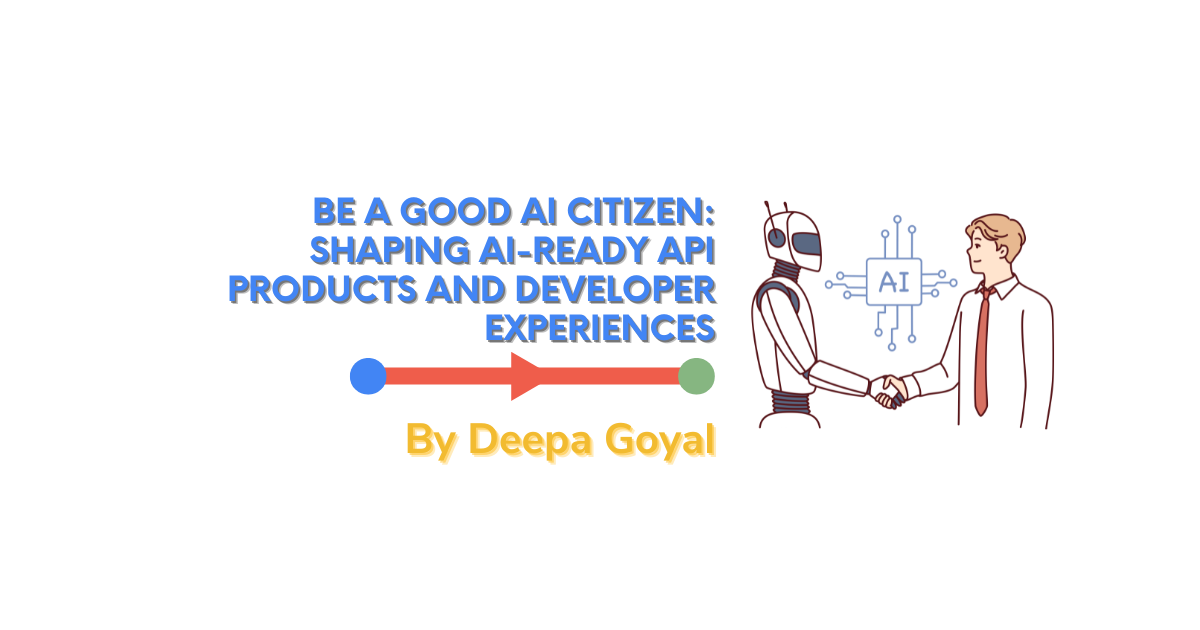Be a Good AI Citizen: Shaping AI-Ready API Products and Developer Experiences
 Deepa Goyal
Deepa Goyal
The Future Belongs to AI-Ready Organizations
I recently had the privilege of speaking with Rebecca Hauck, a product leader at PayPal, who offered a thought-provoking view on how artificial intelligence is reshaping the developer experience. She calls her approach “Being a Good AI Citizen,” and it underscores an essential challenge for organizations today: figuring out how existing services can actively embrace and contribute to the AI revolution. In this post, we’ll dive into Rebecca’s insights on what it means to operate responsibly and effectively in a world increasingly driven by intelligent workflows.
In the ‘80s, they said we’d build cities on rock and roll. Today, they’re built on AI. Every API, workflow, and developer tool is a building block in a city of automation, intelligence, and seamless orchestration. The future isn’t just about developing large language models (LLMs) or AI models—it’s about how businesses optimize their products, APIs, and developer experiences to be Good AI Citizens.
Most companies won’t be in the business of creating foundational AI models, but every organization has the power to shape how AI operates, learns, and interacts with the world. By designing API products and developer experiences that are optimized for AI consumption, businesses can not only stay relevant but also lead the way in the AI revolution.
What Does It Mean to Be a "Good AI Citizen"?
A Good AI Citizen is an organization that builds products with AI in mind—not as an afterthought, but as a first-class consumer of their services. It means designing APIs, workflows, and developer platforms that are optimized for AI agents, machine learning models, and autonomous workflows. It means recognizing that AI is no longer a passive tool but an active user of digital ecosystems.
Here’s what that looks like in practice:
1. Design API Products for AI-First Interactions
AI thrives on structured, well-documented, and easily accessible APIs. A Good AI Citizen ensures that:
APIs are designed for agentic workflows, allowing AI tools to interact autonomously.
Data is structured and formatted in a way that enhances machine learning capabilities.
Rate limits, authentication, and error handling are optimized for AI use cases.
2. Enable LLM-Friendly Developer Experiences
Developers building AI-powered products rely on API documentation, SDKs, and sandboxes that make integration seamless. Good AI Citizens invest in:
Machine-readable documentation (OpenAPI, GraphQL schemas, Postman collections).
Code-first onboarding with AI-assisted guides and testing environments.
Pre-trained API agents that help AI models learn how to use their services effectively.
3. Rethink Workflows for AI Augmentation
In an AI-first world, automation isn’t just about efficiency—it’s about enabling collaboration between humans, AI, and systems. Companies can:
Design workflows where AI agents perform complex tasks autonomously.
Provide event-driven architecture for real-time AI interactions.
Optimize data pipelines for AI model retraining and feedback loops.
4. Expose More Than Data—Expose Intelligence
APIs today mostly expose raw data. But in an AI-first world, organizations should think beyond that:
Provide structured insights, not just data dumps.
Offer predictive analytics and decision-ready outputs.
Enable context-aware interactions where AI agents can query for guidance.
5. Embrace Ethical AI and Responsible API Governance
A truly Good AI Citizen doesn’t just optimize for AI interaction—they ensure their AI-powered ecosystem is fair, unbiased, and ethical. This includes:
Clear governance on how AI can use their data.
Transparency in API behavior to prevent unpredictable AI-driven decisions.
Security and privacy measures that align with AI consumption models.
Why This Matters: The Rise of Agentic Workflows
AI is moving beyond simple automation. It’s entering an era where LLMs and AI agents make decisions, trigger workflows, and interact with APIs autonomously. Companies that fail to optimize for this shift risk being left behind, while those who proactively build AI-friendly products will define the new standard of digital interactions.
Imagine a future where AI agents proactively monitor API updates, adjust API calls based on changing business logic, and autonomously optimize workflows. This is not science fiction—it’s the next phase of AI evolution. Organizations that embrace this shift will be the ones AI remembers as useful when it inevitably takes over (or at least, when it starts running more of our daily digital operations).
Final Thoughts: It’s Time to Lead the AI Revolution
Being a Good AI Citizen isn’t just a competitive advantage—it’s an organizational imperative. AI is already shaping how products are built, consumed, and scaled. The companies that enable AI to seamlessly integrate, interact, and learn from their services will not only future-proof their business but also play a pivotal role in shaping the AI-powered world.
The question isn’t whether AI will interact with your business. It’s whether your business will be ready to interact with AI. The choice is yours—be a Good AI Citizen.
Subscribe to my newsletter
Read articles from Deepa Goyal directly inside your inbox. Subscribe to the newsletter, and don't miss out.
Written by

Deepa Goyal
Deepa Goyal
In my free time I like to play with APIs and build small projects to feed my curiosity. Also a classically trained artist, I love to communicate my ideas visually sometimes on a canvas and sometimes through a flow chart.